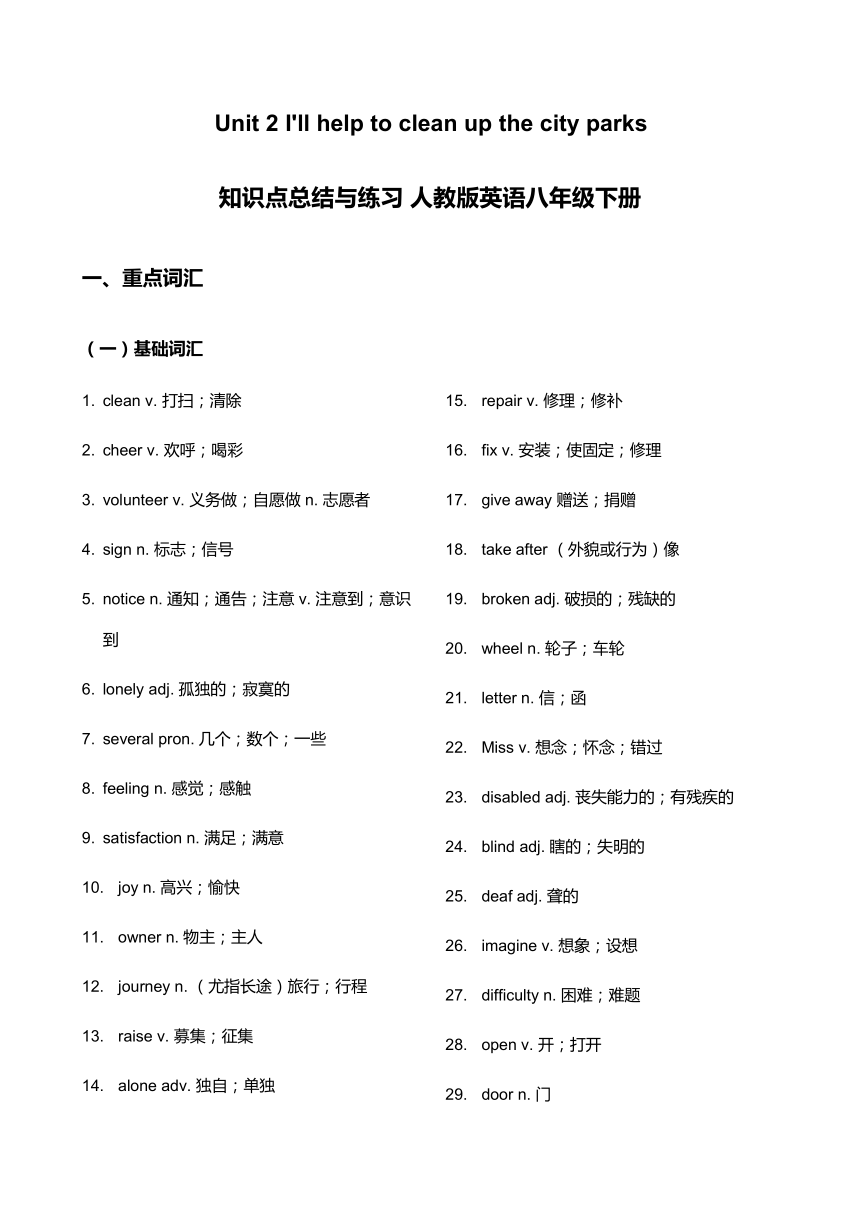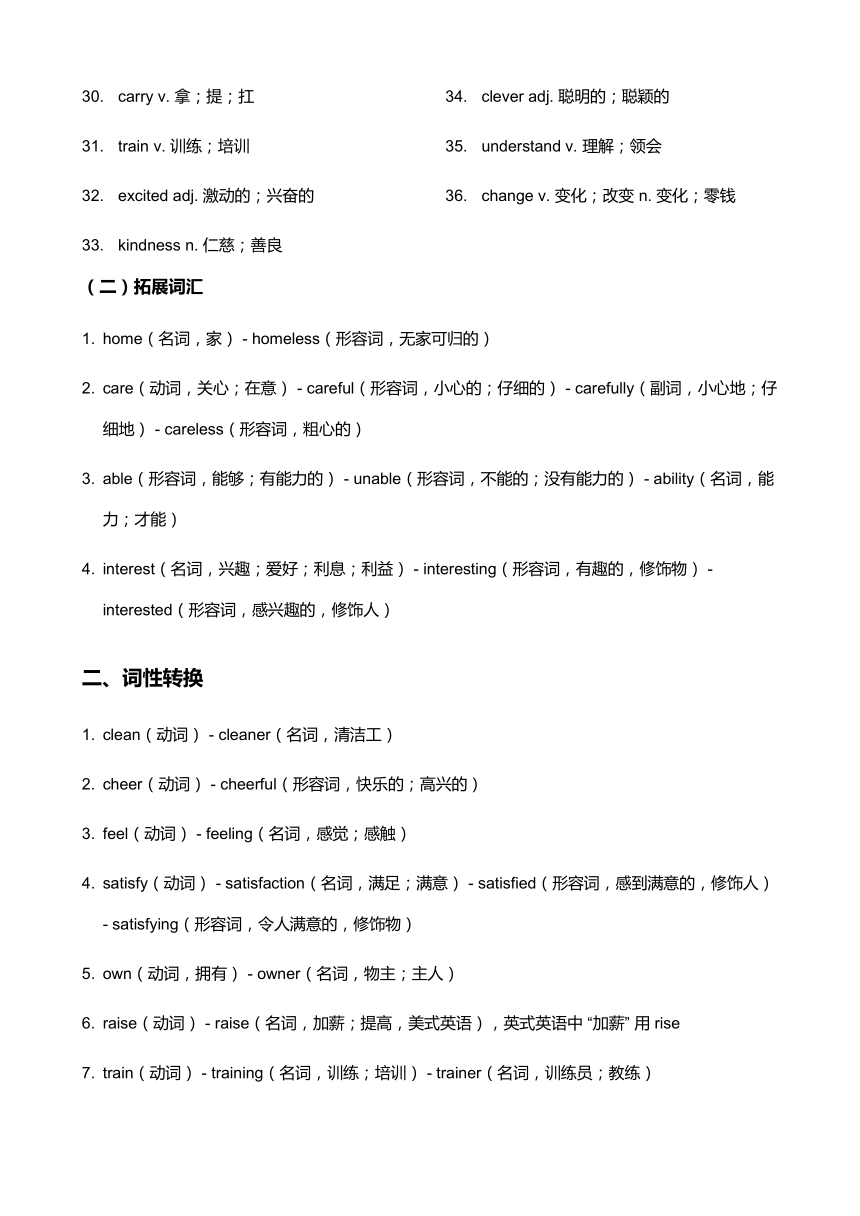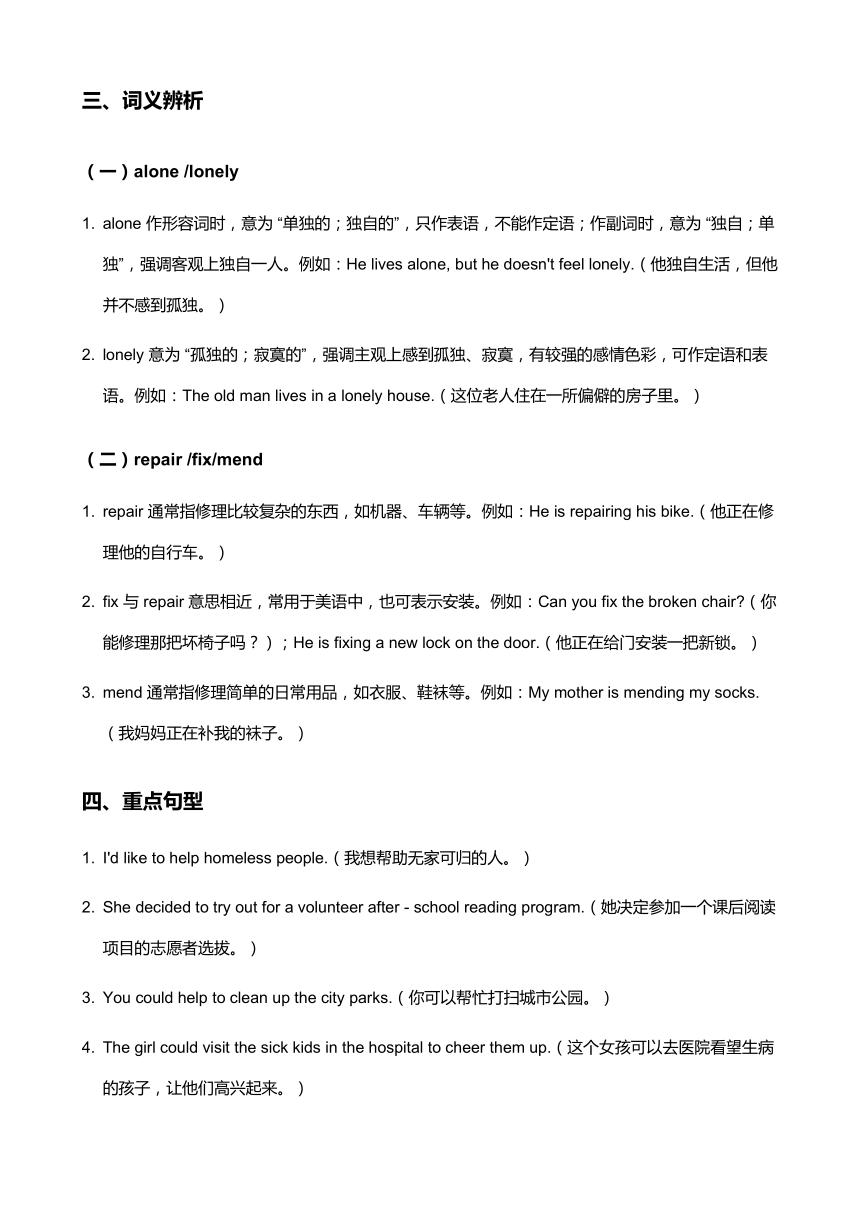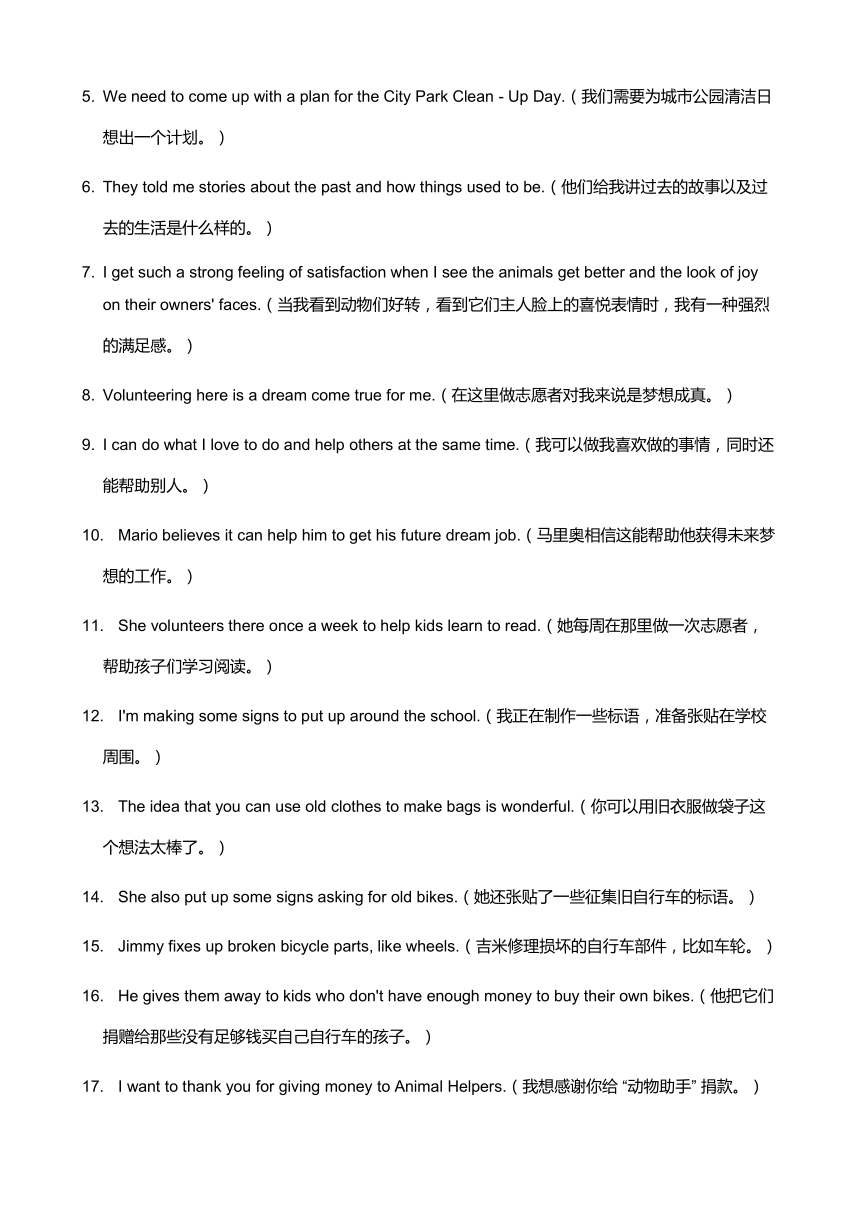Unit 2 I'll help to clean up the city parks.知识点总结与练习(含答案解析) 人教版英语八年级下册
文档属性
| 名称 | Unit 2 I'll help to clean up the city parks.知识点总结与练习(含答案解析) 人教版英语八年级下册 |

|
|
| 格式 | docx | ||
| 文件大小 | 23.7KB | ||
| 资源类型 | 试卷 | ||
| 版本资源 | 人教新目标(Go for it)版 | ||
| 科目 | 英语 | ||
| 更新时间 | 2025-02-10 00:00:00 | ||
图片预览





文档简介
Unit 2 I'll help to clean up the city parks
知识点总结与练习 人教版英语八年级下册
一、重点词汇
(一)基础词汇
clean v. 打扫;清除
cheer v. 欢呼;喝彩
volunteer v. 义务做;自愿做 n. 志愿者
sign n. 标志;信号
notice n. 通知;通告;注意 v. 注意到;意识到
lonely adj. 孤独的;寂寞的
several pron. 几个;数个;一些
feeling n. 感觉;感触
satisfaction n. 满足;满意
joy n. 高兴;愉快
owner n. 物主;主人
journey n. (尤指长途)旅行;行程
raise v. 募集;征集
alone adv. 独自;单独
repair v. 修理;修补
fix v. 安装;使固定;修理
give away 赠送;捐赠
take after (外貌或行为)像
broken adj. 破损的;残缺的
wheel n. 轮子;车轮
letter n. 信;函
Miss v. 想念;怀念;错过
disabled adj. 丧失能力的;有残疾的
blind adj. 瞎的;失明的
deaf adj. 聋的
imagine v. 想象;设想
difficulty n. 困难;难题
open v. 开;打开
door n. 门
carry v. 拿;提;扛
train v. 训练;培训
excited adj. 激动的;兴奋的
kindness n. 仁慈;善良
clever adj. 聪明的;聪颖的
understand v. 理解;领会
change v. 变化;改变 n. 变化;零钱
(二)拓展词汇
home(名词,家) - homeless(形容词,无家可归的)
care(动词,关心;在意) - careful(形容词,小心的;仔细的) - carefully(副词,小心地;仔细地) - careless(形容词,粗心的)
able(形容词,能够;有能力的) - unable(形容词,不能的;没有能力的) - ability(名词,能力;才能)
interest(名词,兴趣;爱好;利息;利益) - interesting(形容词,有趣的,修饰物) - interested(形容词,感兴趣的,修饰人)
二、词性转换
clean(动词) - cleaner(名词,清洁工)
cheer(动词) - cheerful(形容词,快乐的;高兴的)
feel(动词) - feeling(名词,感觉;感触)
satisfy(动词) - satisfaction(名词,满足;满意) - satisfied(形容词,感到满意的,修饰人) - satisfying(形容词,令人满意的,修饰物)
own(动词,拥有) - owner(名词,物主;主人)
raise(动词) - raise(名词,加薪;提高,美式英语),英式英语中 “加薪” 用 rise
train(动词) - training(名词,训练;培训) - trainer(名词,训练员;教练)
三、词义辨析
(一)alone /lonely
alone 作形容词时,意为 “单独的;独自的”,只作表语,不能作定语;作副词时,意为 “独自;单独”,强调客观上独自一人。例如:He lives alone, but he doesn't feel lonely.(他独自生活,但他并不感到孤独。)
lonely 意为 “孤独的;寂寞的”,强调主观上感到孤独、寂寞,有较强的感彩,可作定语和表语。例如:The old man lives in a lonely house.(这位老人住在一所偏僻的房子里。)
(二)repair /fix/mend
repair 通常指修理比较复杂的东西,如机器、车辆等。例如:He is repairing his bike.(他正在修理他的自行车。)
fix 与 repair 意思相近,常用于美语中,也可表示安装。例如:Can you fix the broken chair (你能修理那把坏椅子吗?);He is fixing a new lock on the door.(他正在给门安装一把新锁。)
mend 通常指修理简单的日常用品,如衣服、鞋袜等。例如:My mother is mending my socks.(我妈妈正在补我的袜子。)
四、重点句型
I'd like to help homeless people.(我想帮助无家可归的人。)
She decided to try out for a volunteer after - school reading program.(她决定参加一个课后阅读项目的志愿者选拔。)
You could help to clean up the city parks.(你可以帮忙打扫城市公园。)
The girl could visit the sick kids in the hospital to cheer them up.(这个女孩可以去医院看望生病的孩子,让他们高兴起来。)
We need to come up with a plan for the City Park Clean - Up Day.(我们需要为城市公园清洁日想出一个计划。)
They told me stories about the past and how things used to be.(他们给我讲过去的故事以及过去的生活是什么样的。)
I get such a strong feeling of satisfaction when I see the animals get better and the look of joy on their owners' faces.(当我看到动物们好转,看到它们主人脸上的喜悦表情时,我有一种强烈的满足感。)
Volunteering here is a dream come true for me.(在这里做志愿者对我来说是梦想成真。)
I can do what I love to do and help others at the same time.(我可以做我喜欢做的事情,同时还能帮助别人。)
Mario believes it can help him to get his future dream job.(马里奥相信这能帮助他获得未来梦想的工作。)
She volunteers there once a week to help kids learn to read.(她每周在那里做一次志愿者,帮助孩子们学习阅读。)
I'm making some signs to put up around the school.(我正在制作一些标语,准备张贴在学校周围。)
The idea that you can use old clothes to make bags is wonderful.(你可以用旧衣服做袋子这个想法太棒了。)
She also put up some signs asking for old bikes.(她还张贴了一些征集旧自行车的标语。)
Jimmy fixes up broken bicycle parts, like wheels.(吉米修理损坏的自行车部件,比如车轮。)
He gives them away to kids who don't have enough money to buy their own bikes.(他把它们捐赠给那些没有足够钱买自己自行车的孩子。)
I want to thank you for giving money to Animal Helpers.(我想感谢你给 “动物助手” 捐款。)
What would it be like to be blind or deaf (失明或失聪会是什么样呢?)
I can't use my arms or legs well, so normal things like answering the telephone, opening and closing doors, or carrying things are difficult for me.(我不能很好地使用我的胳膊和腿,所以像接电话、开门关门或拿东西这样的平常事对我来说都很困难。)
Lucky makes a big difference to my life.(“幸运” 对我的生活产生了很大的影响。 )
五、语法聚焦:动词不定式(to do)作宾语、宾语补足语和目的状语
作宾语:一些动词后面常接动词不定式作宾语,常见的有 want, decide, hope, expect, plan, would like 等。例如:I want to go shopping.(我想去购物。);She decides to study hard.(她决定努力学习。)
作宾语补足语:动词不定式可以作宾语补足语,常用的结构为 “动词 + 宾语 + 动词不定式”,常见的接动词不定式作宾语补足语的动词有 ask, tell, want, help, teach 等。例如:My mother asks me to clean my room.(我妈妈让我打扫我的房间。);The teacher teaches us to read English.(老师教我们读英语。)
作目的状语:动词不定式作目的状语,通常放在句首或句末,用来表示行为的目的。例如:To get good grades, we need to study hard.(为了取得好成绩,我们需要努力学习。);We get up early to catch the first bus.(我们早起是为了赶上第一班公共汽车。)
六、练习题
(一)词汇填空
We can put up some s______ to let more people know the plan.
She felt very l______ when she was alone at home.
The old man has no family and he often feels l______.
I have a strong f______ of satisfaction when I help others.
They are going to r______ some money for the poor students.
(二)用所给词的适当形式填空
She hopes ______ (visit) the Great Wall one day.
The teacher asked us ______ (clean) the classroom after class.
He decided ______ (not go) to the party.
We should help those ______ (disable) people.
The boy is very ______ (excite) about the good news.
(三)单项选择
My mother often asks me ______ early.
A. get up B. gets up C. to get up D. getting up
She ______ to be a volunteer in the after - school reading program.
A. decided B. decides C. deciding D. decide
The old man lives ______ but he doesn't feel ______.
A. alone; alone B. lonely; lonely C. alone; lonely D. lonely; alone
They need to ______ a plan to tell people about the book sale.
A. come up with B. give up C. put up D. set up
The students are making some signs ______ around the school.
A. put up B. to put up C. putting up D. puts up
(四)句型转换
She wants to be a volunteer.(对划线部分提问)
______ does she ______ to be
I'd like to help the old man.(改为一般疑问句)
______ you ______ to help the old man
They decided to go to the mountains.(改为否定句)
They decided ______ ______ to the mountains.
To get good grades, we need to study hard.(改为同义句)
______ we ______ to study hard, we can't get good grades.
He gives away some old books to the children.(改为被动语态)
Some old books ______ ______ away to the children by him.
(五)阅读理解
Wang Ping is a cleaner. He has worked in a park for 5 years. He is also a good father. Nothing can make him happier than playing with his little daughter in his free time.
Last Tuesday afternoon, while he was cleaning the park, suddenly, he heard a woman crying for help. He ran up quickly to see what happened. The woman's 15 - month - old baby girl choked(窒息)on a small piece of pear and her face turned purple. The baby was too young to save herself, and the mother was so nervous that she didn't know how to save her daughter properly. Luckily, Wang Ping knew what to do. He took the baby in his arms without thinking twice. With the mother's help, Wang Ping held the baby upside down and gave her a few pats(轻拍)on the back. After a short while, he succeeded in getting the piece of pear out of her mouth. The baby began to cry. Her mom was so thankful because her daughter was saved.
Wang Ping tried his best and saved the baby's life. In his mind, helping others is just helping himself. He hoped more people could volunteer to help the people in need if possible.
What does Wang Ping do
A. A teacher. B. A cleaner. C. A doctor. D. A driver.
What was the woman doing when Wang Ping heard her crying for help
A. She was playing with her baby in the park.
B. She was cleaning the park.
C. Her baby girl was choking on a small piece of pear.
D. She was talking with others.
What does the underlined word “nervous” mean in Chinese
A. 紧张的 B. 悲伤的 C. 兴奋的 D. 疲劳的
What did Wang Ping do to save the baby
A. He called the police.
B. He took the baby to the hospital.
C. He asked the mother to take the baby to the hospital.
D. He held the baby upside down and gave her a few pats on the back.
Which of the following is TRUE according to the passage
A. Wang Ping has worked in the park for 6 years.
B. Wang Ping didn't save the baby.
C. The mother was too nervous to save her baby.
D. Wang Ping wasn't happy to help others.
(六)书面表达
假如你是李华,你的学校正在开展志愿者活动。请你根据以下要点提示,写一篇英语短文,介绍你参加志愿者活动的经历和感受。
要点提示:
你参加了什么志愿者活动;
你在活动中做了什么;
你的感受和收获。
要求:
包含所有要点内容,可适当发挥;
语言表达准确,语意通顺、连贯;
词数:60 - 80 词。
答案及解析
(一)词汇填空
signs 解析:根据 “让更多人知道这个计划” 以及 “put up”(张贴),可知是张贴标语,some 后接可数名词复数,故填 signs。
lonely 解析:根据 “独自在家” 可知是感到孤独,feel 是系动词,后接形容词,故填 lonely。
lonely 解析:“没有家人” 所以经常感到孤独,feel 后接形容词 lonely。
feeling 解析:“a strong feeling of...” 表示 “一种强烈的…… 感觉”,故填 feeling。
raise 解析:“raise money” 表示 “募捐;筹钱”,be going to 后接动词原形,所以填 raise。
(二)用所给词的适当形式填空
to visit 解析:“hope to do sth.” 表示 “希望做某事”,所以填 to visit。
to clean 解析:“ask sb. to do sth.” 表示 “要求某人做某事”,故填 to clean。
not to go 解析:“decide not to do sth.” 表示 “决定不做某事”,所以填 not to go。
disabled 解析:修饰名词 “people” 要用形容词,disable 的形容词形式是 disabled(残疾的),故填 disabled。
excited 解析:“be excited about...” 表示 “对…… 感到兴奋”,修饰人用 excited,所以填 excited。
(三)单项选择
C 解析:“ask sb. to do sth.” 是固定结构,意为 “让某人做某事”,所以选 C。
A 解析:主语是 she,根据语境可知用一般过去时,decide 的过去式是 decided,所以选 A。
C 解析:live alone 表示 “独自居住”,强调客观状态;feel lonely 表示 “感到孤独”,强调主观感受,所以选 C。
A 解析:come up with 意为 “想出”;give up 意为 “放弃”;put up 意为 “张贴;搭建”;set up 意为 “建立”。根据 “a plan” 可知是想出一个计划,所以选 A。
B 解析:此处用动词不定式 to put up 作目的状语,表示 “制作标语的目的是张贴在学校周围”,所以选 B。
(四)句型转换
What; want 解析:对 “a volunteer” 提问,用 what,原句是一般现在时,主语是 she,借助助动词 does,后面动词用原形 want。
Would; like 解析:I'd like 是 I would like 的缩写,改为一般疑问句把 would 提到句首,所以是 Would you like。
not to go 解析:decide to do sth. 的否定形式是 decide not to do sth.,所以填 not to go。
If; don't need 解析:原句 “为了取得好成绩,我们需要努力学习”,同义句可改为 “如果我们不需要努力学习,就不能取得好成绩”,if 引导条件状语从句,遵循 “主将从现” 原则,所以填 If; don't need。
are given 解析:原句是一般现在时,改为被动语态,结构为 “be + 过去分词”,主语是 books,复数,be 动词用 are,give 的过去分词是 given,所以是 are given。
(五)阅读理解
B 解析:根据 “Wang Ping is a cleaner.” 可知,王平是一名清洁工,所以选 B。
C 解析:根据 “The woman's 15 - month - old baby girl choked on a small piece of pear and her face turned purple.” 可知,当王平听到她呼救时,她的宝宝被一小块梨噎住了,所以选 C。
3. A 解析:宝宝被噎住,妈妈不知道如何正确施救,此时的状态应是 “紧张的”,所以 “nervous” 意思是 “紧张的”,选 A。
4. D 解析:根据 “With the mother's help, Wang Ping held the baby upside down and gave her a few pats on the back.” 可知,王平把宝宝倒过来,拍她的后背来救她,选 D。
5. C 解析:A 选项,文中提到王平在公园工作 5 年,不是 6 年;B 选项,王平成功救了宝宝;C 选项,文中说 “The baby was too young to save herself, and the mother was so nervous that she didn't know how to save her daughter properly.”,妈妈太紧张而无法救宝宝,该选项正确;D 选项,文中表明王平认为帮助别人就是帮助自己,说明他乐于帮助别人 。所以选 C。
(六)书面表达(参考范文)
略
知识点总结与练习 人教版英语八年级下册
一、重点词汇
(一)基础词汇
clean v. 打扫;清除
cheer v. 欢呼;喝彩
volunteer v. 义务做;自愿做 n. 志愿者
sign n. 标志;信号
notice n. 通知;通告;注意 v. 注意到;意识到
lonely adj. 孤独的;寂寞的
several pron. 几个;数个;一些
feeling n. 感觉;感触
satisfaction n. 满足;满意
joy n. 高兴;愉快
owner n. 物主;主人
journey n. (尤指长途)旅行;行程
raise v. 募集;征集
alone adv. 独自;单独
repair v. 修理;修补
fix v. 安装;使固定;修理
give away 赠送;捐赠
take after (外貌或行为)像
broken adj. 破损的;残缺的
wheel n. 轮子;车轮
letter n. 信;函
Miss v. 想念;怀念;错过
disabled adj. 丧失能力的;有残疾的
blind adj. 瞎的;失明的
deaf adj. 聋的
imagine v. 想象;设想
difficulty n. 困难;难题
open v. 开;打开
door n. 门
carry v. 拿;提;扛
train v. 训练;培训
excited adj. 激动的;兴奋的
kindness n. 仁慈;善良
clever adj. 聪明的;聪颖的
understand v. 理解;领会
change v. 变化;改变 n. 变化;零钱
(二)拓展词汇
home(名词,家) - homeless(形容词,无家可归的)
care(动词,关心;在意) - careful(形容词,小心的;仔细的) - carefully(副词,小心地;仔细地) - careless(形容词,粗心的)
able(形容词,能够;有能力的) - unable(形容词,不能的;没有能力的) - ability(名词,能力;才能)
interest(名词,兴趣;爱好;利息;利益) - interesting(形容词,有趣的,修饰物) - interested(形容词,感兴趣的,修饰人)
二、词性转换
clean(动词) - cleaner(名词,清洁工)
cheer(动词) - cheerful(形容词,快乐的;高兴的)
feel(动词) - feeling(名词,感觉;感触)
satisfy(动词) - satisfaction(名词,满足;满意) - satisfied(形容词,感到满意的,修饰人) - satisfying(形容词,令人满意的,修饰物)
own(动词,拥有) - owner(名词,物主;主人)
raise(动词) - raise(名词,加薪;提高,美式英语),英式英语中 “加薪” 用 rise
train(动词) - training(名词,训练;培训) - trainer(名词,训练员;教练)
三、词义辨析
(一)alone /lonely
alone 作形容词时,意为 “单独的;独自的”,只作表语,不能作定语;作副词时,意为 “独自;单独”,强调客观上独自一人。例如:He lives alone, but he doesn't feel lonely.(他独自生活,但他并不感到孤独。)
lonely 意为 “孤独的;寂寞的”,强调主观上感到孤独、寂寞,有较强的感彩,可作定语和表语。例如:The old man lives in a lonely house.(这位老人住在一所偏僻的房子里。)
(二)repair /fix/mend
repair 通常指修理比较复杂的东西,如机器、车辆等。例如:He is repairing his bike.(他正在修理他的自行车。)
fix 与 repair 意思相近,常用于美语中,也可表示安装。例如:Can you fix the broken chair (你能修理那把坏椅子吗?);He is fixing a new lock on the door.(他正在给门安装一把新锁。)
mend 通常指修理简单的日常用品,如衣服、鞋袜等。例如:My mother is mending my socks.(我妈妈正在补我的袜子。)
四、重点句型
I'd like to help homeless people.(我想帮助无家可归的人。)
She decided to try out for a volunteer after - school reading program.(她决定参加一个课后阅读项目的志愿者选拔。)
You could help to clean up the city parks.(你可以帮忙打扫城市公园。)
The girl could visit the sick kids in the hospital to cheer them up.(这个女孩可以去医院看望生病的孩子,让他们高兴起来。)
We need to come up with a plan for the City Park Clean - Up Day.(我们需要为城市公园清洁日想出一个计划。)
They told me stories about the past and how things used to be.(他们给我讲过去的故事以及过去的生活是什么样的。)
I get such a strong feeling of satisfaction when I see the animals get better and the look of joy on their owners' faces.(当我看到动物们好转,看到它们主人脸上的喜悦表情时,我有一种强烈的满足感。)
Volunteering here is a dream come true for me.(在这里做志愿者对我来说是梦想成真。)
I can do what I love to do and help others at the same time.(我可以做我喜欢做的事情,同时还能帮助别人。)
Mario believes it can help him to get his future dream job.(马里奥相信这能帮助他获得未来梦想的工作。)
She volunteers there once a week to help kids learn to read.(她每周在那里做一次志愿者,帮助孩子们学习阅读。)
I'm making some signs to put up around the school.(我正在制作一些标语,准备张贴在学校周围。)
The idea that you can use old clothes to make bags is wonderful.(你可以用旧衣服做袋子这个想法太棒了。)
She also put up some signs asking for old bikes.(她还张贴了一些征集旧自行车的标语。)
Jimmy fixes up broken bicycle parts, like wheels.(吉米修理损坏的自行车部件,比如车轮。)
He gives them away to kids who don't have enough money to buy their own bikes.(他把它们捐赠给那些没有足够钱买自己自行车的孩子。)
I want to thank you for giving money to Animal Helpers.(我想感谢你给 “动物助手” 捐款。)
What would it be like to be blind or deaf (失明或失聪会是什么样呢?)
I can't use my arms or legs well, so normal things like answering the telephone, opening and closing doors, or carrying things are difficult for me.(我不能很好地使用我的胳膊和腿,所以像接电话、开门关门或拿东西这样的平常事对我来说都很困难。)
Lucky makes a big difference to my life.(“幸运” 对我的生活产生了很大的影响。 )
五、语法聚焦:动词不定式(to do)作宾语、宾语补足语和目的状语
作宾语:一些动词后面常接动词不定式作宾语,常见的有 want, decide, hope, expect, plan, would like 等。例如:I want to go shopping.(我想去购物。);She decides to study hard.(她决定努力学习。)
作宾语补足语:动词不定式可以作宾语补足语,常用的结构为 “动词 + 宾语 + 动词不定式”,常见的接动词不定式作宾语补足语的动词有 ask, tell, want, help, teach 等。例如:My mother asks me to clean my room.(我妈妈让我打扫我的房间。);The teacher teaches us to read English.(老师教我们读英语。)
作目的状语:动词不定式作目的状语,通常放在句首或句末,用来表示行为的目的。例如:To get good grades, we need to study hard.(为了取得好成绩,我们需要努力学习。);We get up early to catch the first bus.(我们早起是为了赶上第一班公共汽车。)
六、练习题
(一)词汇填空
We can put up some s______ to let more people know the plan.
She felt very l______ when she was alone at home.
The old man has no family and he often feels l______.
I have a strong f______ of satisfaction when I help others.
They are going to r______ some money for the poor students.
(二)用所给词的适当形式填空
She hopes ______ (visit) the Great Wall one day.
The teacher asked us ______ (clean) the classroom after class.
He decided ______ (not go) to the party.
We should help those ______ (disable) people.
The boy is very ______ (excite) about the good news.
(三)单项选择
My mother often asks me ______ early.
A. get up B. gets up C. to get up D. getting up
She ______ to be a volunteer in the after - school reading program.
A. decided B. decides C. deciding D. decide
The old man lives ______ but he doesn't feel ______.
A. alone; alone B. lonely; lonely C. alone; lonely D. lonely; alone
They need to ______ a plan to tell people about the book sale.
A. come up with B. give up C. put up D. set up
The students are making some signs ______ around the school.
A. put up B. to put up C. putting up D. puts up
(四)句型转换
She wants to be a volunteer.(对划线部分提问)
______ does she ______ to be
I'd like to help the old man.(改为一般疑问句)
______ you ______ to help the old man
They decided to go to the mountains.(改为否定句)
They decided ______ ______ to the mountains.
To get good grades, we need to study hard.(改为同义句)
______ we ______ to study hard, we can't get good grades.
He gives away some old books to the children.(改为被动语态)
Some old books ______ ______ away to the children by him.
(五)阅读理解
Wang Ping is a cleaner. He has worked in a park for 5 years. He is also a good father. Nothing can make him happier than playing with his little daughter in his free time.
Last Tuesday afternoon, while he was cleaning the park, suddenly, he heard a woman crying for help. He ran up quickly to see what happened. The woman's 15 - month - old baby girl choked(窒息)on a small piece of pear and her face turned purple. The baby was too young to save herself, and the mother was so nervous that she didn't know how to save her daughter properly. Luckily, Wang Ping knew what to do. He took the baby in his arms without thinking twice. With the mother's help, Wang Ping held the baby upside down and gave her a few pats(轻拍)on the back. After a short while, he succeeded in getting the piece of pear out of her mouth. The baby began to cry. Her mom was so thankful because her daughter was saved.
Wang Ping tried his best and saved the baby's life. In his mind, helping others is just helping himself. He hoped more people could volunteer to help the people in need if possible.
What does Wang Ping do
A. A teacher. B. A cleaner. C. A doctor. D. A driver.
What was the woman doing when Wang Ping heard her crying for help
A. She was playing with her baby in the park.
B. She was cleaning the park.
C. Her baby girl was choking on a small piece of pear.
D. She was talking with others.
What does the underlined word “nervous” mean in Chinese
A. 紧张的 B. 悲伤的 C. 兴奋的 D. 疲劳的
What did Wang Ping do to save the baby
A. He called the police.
B. He took the baby to the hospital.
C. He asked the mother to take the baby to the hospital.
D. He held the baby upside down and gave her a few pats on the back.
Which of the following is TRUE according to the passage
A. Wang Ping has worked in the park for 6 years.
B. Wang Ping didn't save the baby.
C. The mother was too nervous to save her baby.
D. Wang Ping wasn't happy to help others.
(六)书面表达
假如你是李华,你的学校正在开展志愿者活动。请你根据以下要点提示,写一篇英语短文,介绍你参加志愿者活动的经历和感受。
要点提示:
你参加了什么志愿者活动;
你在活动中做了什么;
你的感受和收获。
要求:
包含所有要点内容,可适当发挥;
语言表达准确,语意通顺、连贯;
词数:60 - 80 词。
答案及解析
(一)词汇填空
signs 解析:根据 “让更多人知道这个计划” 以及 “put up”(张贴),可知是张贴标语,some 后接可数名词复数,故填 signs。
lonely 解析:根据 “独自在家” 可知是感到孤独,feel 是系动词,后接形容词,故填 lonely。
lonely 解析:“没有家人” 所以经常感到孤独,feel 后接形容词 lonely。
feeling 解析:“a strong feeling of...” 表示 “一种强烈的…… 感觉”,故填 feeling。
raise 解析:“raise money” 表示 “募捐;筹钱”,be going to 后接动词原形,所以填 raise。
(二)用所给词的适当形式填空
to visit 解析:“hope to do sth.” 表示 “希望做某事”,所以填 to visit。
to clean 解析:“ask sb. to do sth.” 表示 “要求某人做某事”,故填 to clean。
not to go 解析:“decide not to do sth.” 表示 “决定不做某事”,所以填 not to go。
disabled 解析:修饰名词 “people” 要用形容词,disable 的形容词形式是 disabled(残疾的),故填 disabled。
excited 解析:“be excited about...” 表示 “对…… 感到兴奋”,修饰人用 excited,所以填 excited。
(三)单项选择
C 解析:“ask sb. to do sth.” 是固定结构,意为 “让某人做某事”,所以选 C。
A 解析:主语是 she,根据语境可知用一般过去时,decide 的过去式是 decided,所以选 A。
C 解析:live alone 表示 “独自居住”,强调客观状态;feel lonely 表示 “感到孤独”,强调主观感受,所以选 C。
A 解析:come up with 意为 “想出”;give up 意为 “放弃”;put up 意为 “张贴;搭建”;set up 意为 “建立”。根据 “a plan” 可知是想出一个计划,所以选 A。
B 解析:此处用动词不定式 to put up 作目的状语,表示 “制作标语的目的是张贴在学校周围”,所以选 B。
(四)句型转换
What; want 解析:对 “a volunteer” 提问,用 what,原句是一般现在时,主语是 she,借助助动词 does,后面动词用原形 want。
Would; like 解析:I'd like 是 I would like 的缩写,改为一般疑问句把 would 提到句首,所以是 Would you like。
not to go 解析:decide to do sth. 的否定形式是 decide not to do sth.,所以填 not to go。
If; don't need 解析:原句 “为了取得好成绩,我们需要努力学习”,同义句可改为 “如果我们不需要努力学习,就不能取得好成绩”,if 引导条件状语从句,遵循 “主将从现” 原则,所以填 If; don't need。
are given 解析:原句是一般现在时,改为被动语态,结构为 “be + 过去分词”,主语是 books,复数,be 动词用 are,give 的过去分词是 given,所以是 are given。
(五)阅读理解
B 解析:根据 “Wang Ping is a cleaner.” 可知,王平是一名清洁工,所以选 B。
C 解析:根据 “The woman's 15 - month - old baby girl choked on a small piece of pear and her face turned purple.” 可知,当王平听到她呼救时,她的宝宝被一小块梨噎住了,所以选 C。
3. A 解析:宝宝被噎住,妈妈不知道如何正确施救,此时的状态应是 “紧张的”,所以 “nervous” 意思是 “紧张的”,选 A。
4. D 解析:根据 “With the mother's help, Wang Ping held the baby upside down and gave her a few pats on the back.” 可知,王平把宝宝倒过来,拍她的后背来救她,选 D。
5. C 解析:A 选项,文中提到王平在公园工作 5 年,不是 6 年;B 选项,王平成功救了宝宝;C 选项,文中说 “The baby was too young to save herself, and the mother was so nervous that she didn't know how to save her daughter properly.”,妈妈太紧张而无法救宝宝,该选项正确;D 选项,文中表明王平认为帮助别人就是帮助自己,说明他乐于帮助别人 。所以选 C。
(六)书面表达(参考范文)
略
同课章节目录
- Unit 1 What's the matter?
- Section A
- Section B
- Unit 2 I'll help to clean up the city parks.
- Section A
- Section B
- Unit 3 Could you please clean your room?
- Section A
- Section B
- Unit 4 Why don't you talk to your parents?
- Section A
- Section B
- Unit 5 What were you doing when the rainstorm came
- Section A
- Section B
- Review of Units 1-5
- Unit 6 An old man tried to move the mountains.
- Section A
- Section B
- Unit 7 What's the highest mountain in the world?
- Section A
- Section B
- Unit 8 Have you read Treasure Island yet?
- Section A
- Section B
- Unit 9 Have you ever been to a museum?
- Section A
- Section B
- Unit 10 I've had this bike for three years.
- Section A
- Section B
